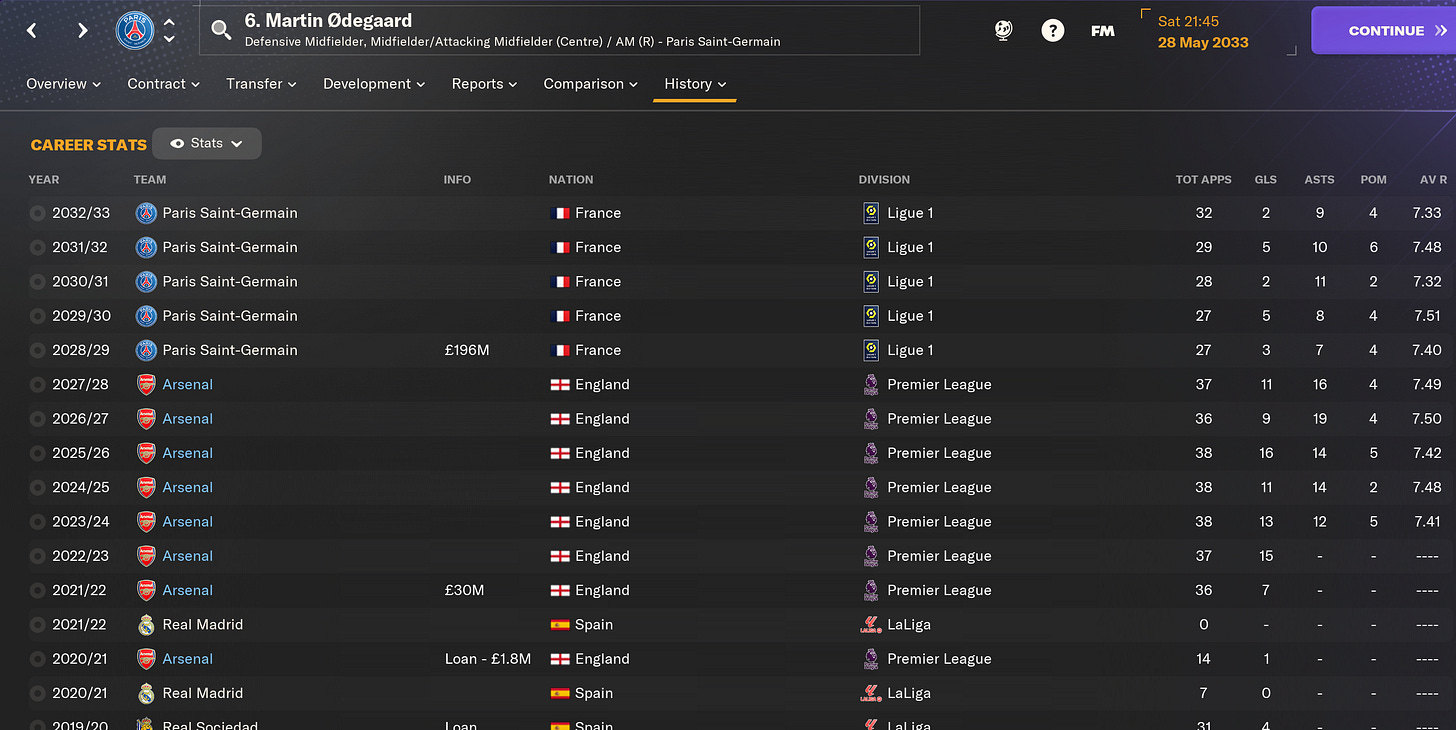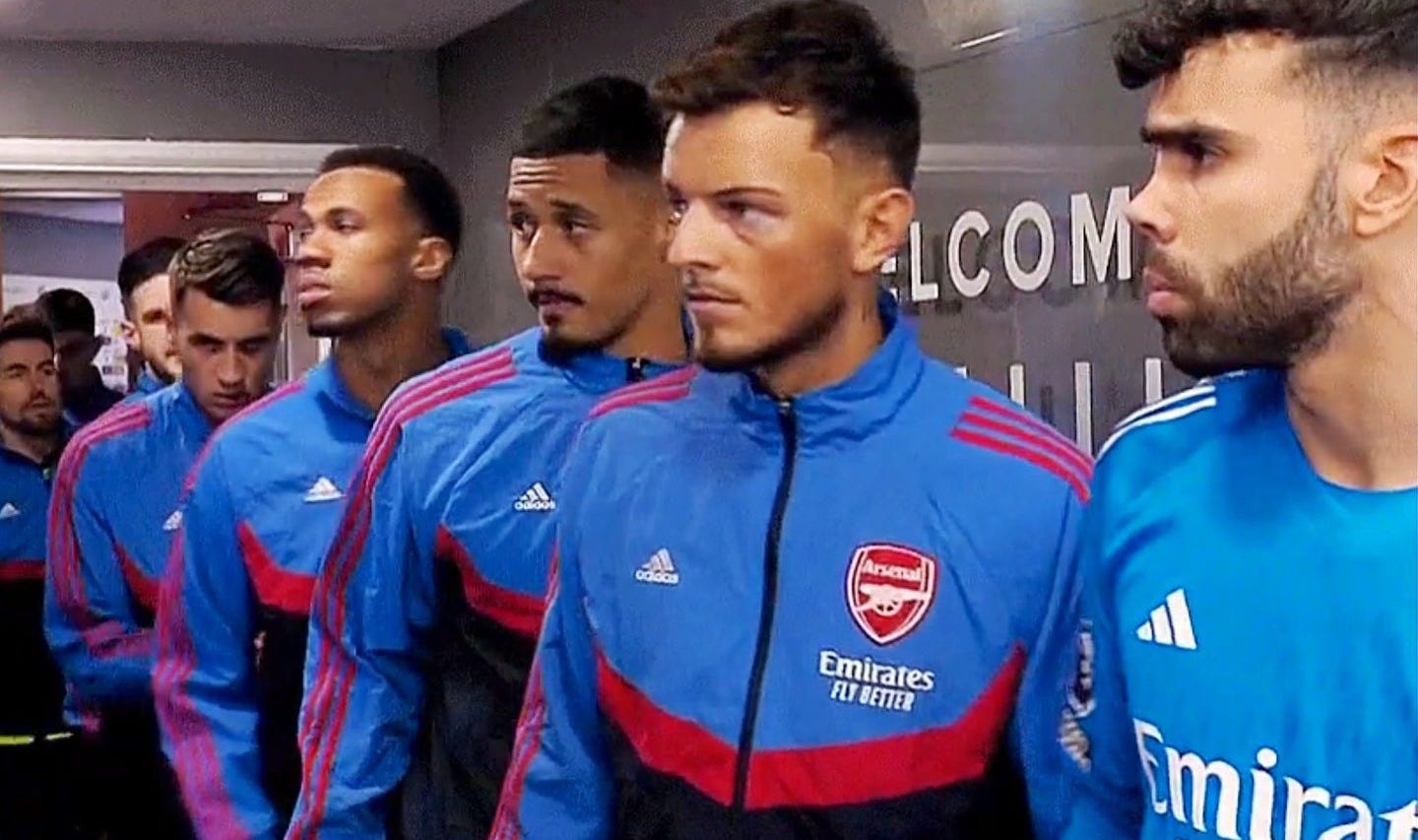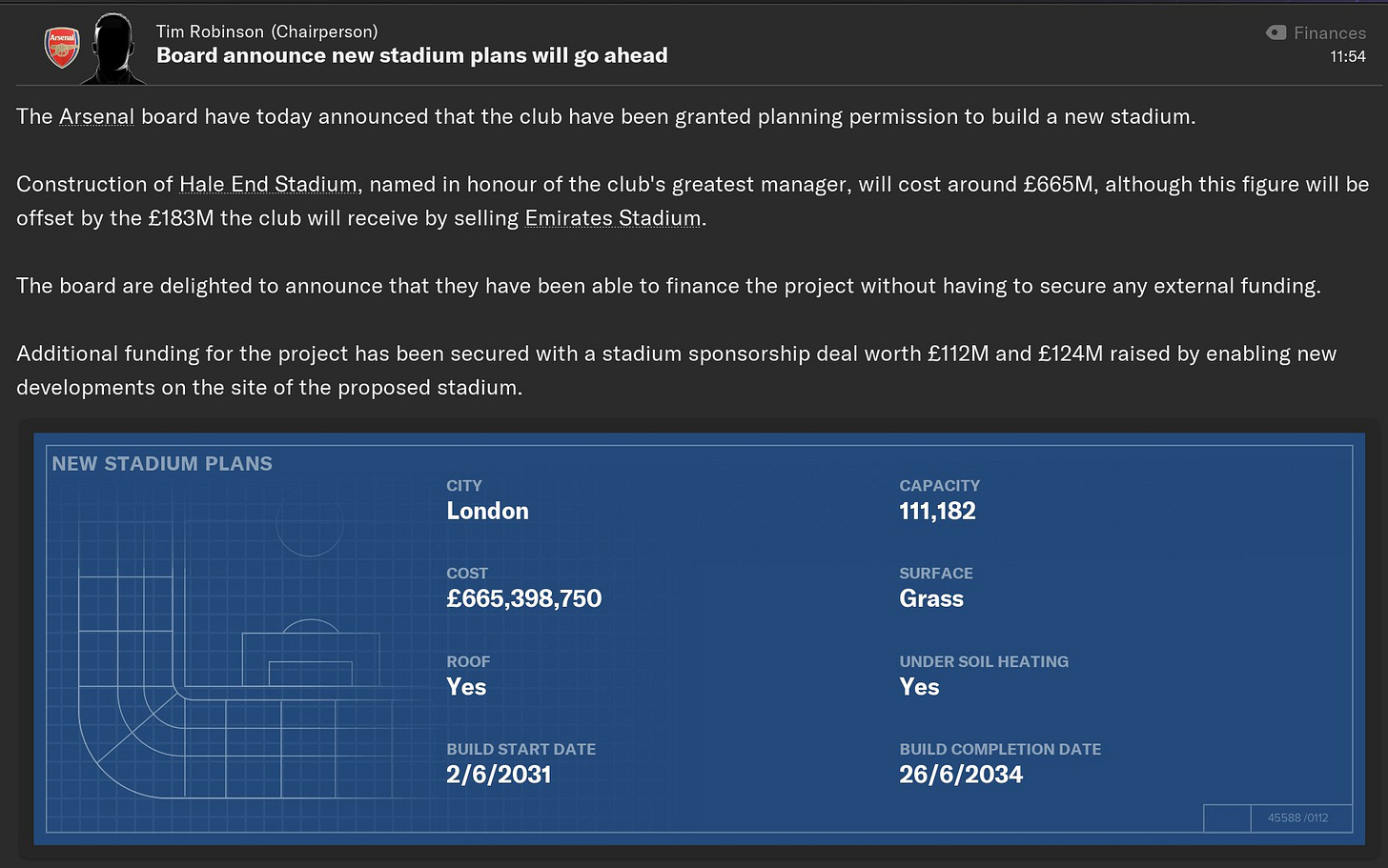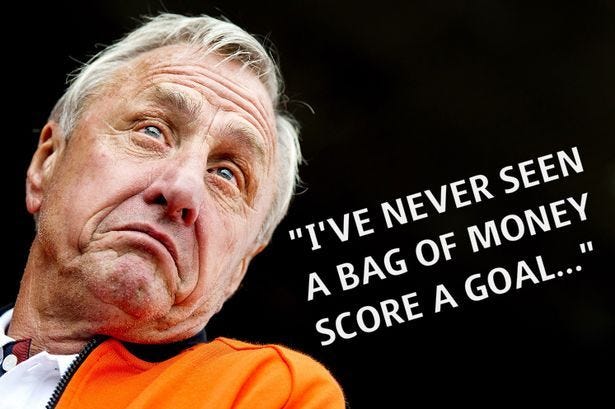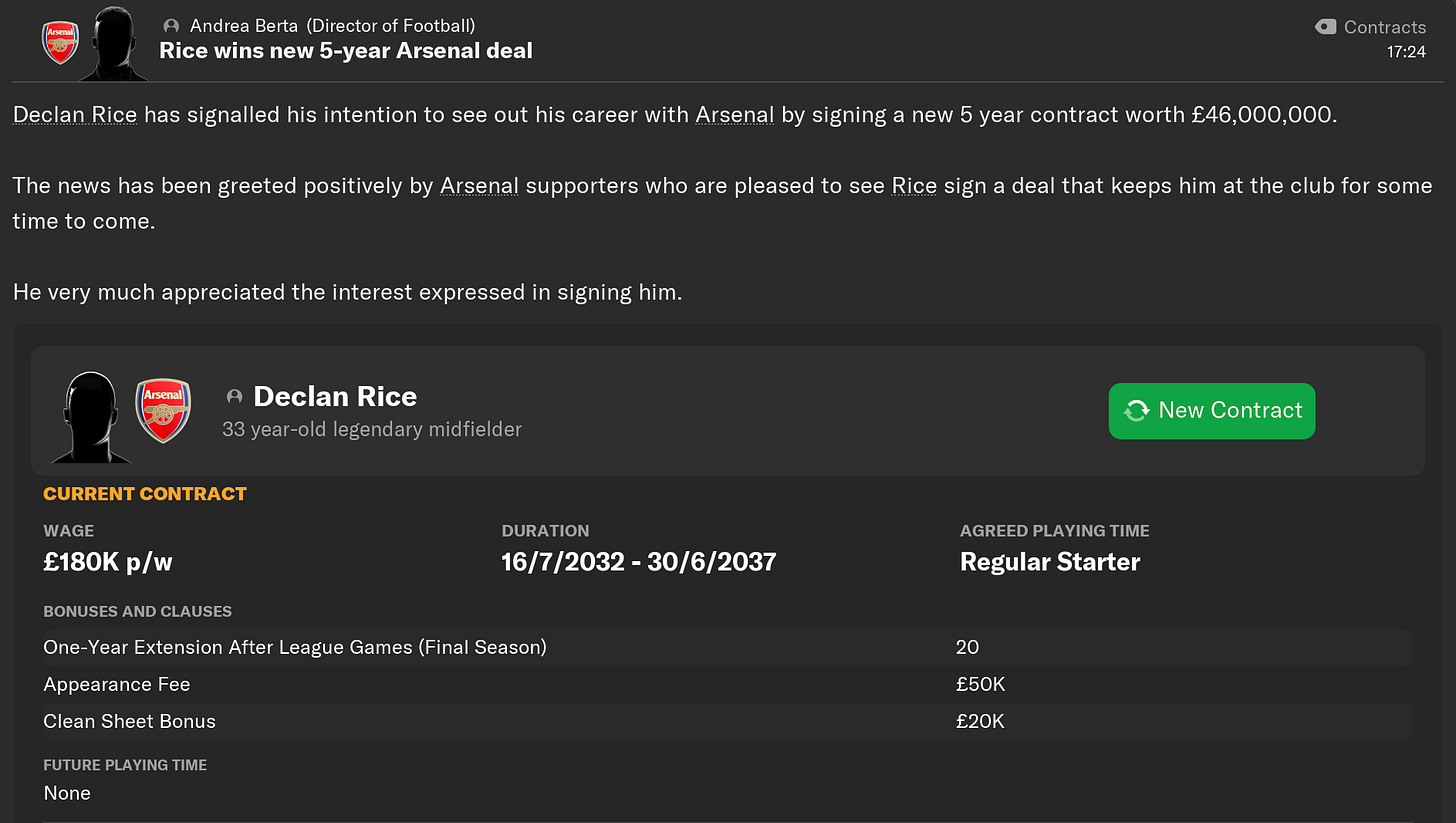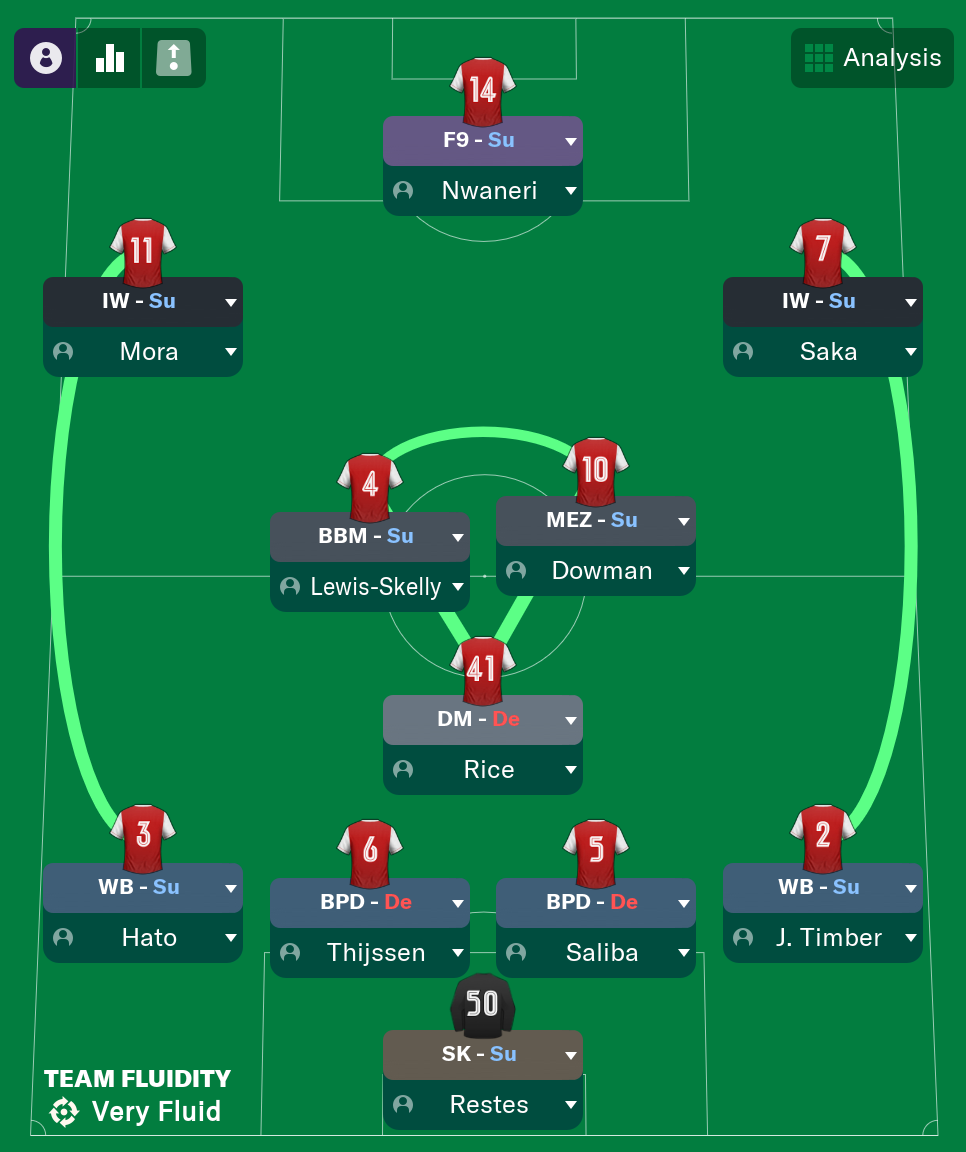You join me in summer 2033 as Arsenal celebrate a hat-trick of consecutive Champions League, Premier League, and FA Cup trebles, finally finishing 2032/33 Invincible - P38, W37, D1, L0 - but, despite this success, I feel a lingering sense of regret at club legends unfulfilled..
The ‘Football Manager Lifecycle’
Readers of my Youth Development post will recall the opening paragraph.
Youth Development is the very essence of Football Manager 2024; scouring the world for wonderkids, watching proudly as they develop into legends, destroying your rivals, and conquering the football world, then selling them when they turn 29 years old, only to do it all over again..
This post challenges the traditional notion of selling players for maximum financial gain at 29-30 years old, highlighting the value of keeping experienced players performing at an elite level later in their careers to maximise their priceless value as club legends.
Club Legends Unfulfilled
Martin Ødegaard, Kai Havertz, Gabriel Martinelli, Gabriel, and Ben White formed the foundation of the squad that propelled Arsenal to immortality, but - with the benefit of hindsight - left the club before truely attaining legendary status.
Club captain Martin Ødegaard left Arsenal - as ‘Favoured Personnel’, before reaching Icon or Legend status - to oil-rich Paris Saint-Germain for a world record £196m at 29-years old in summer 2028.
Captaining PSG to five consecutive Ligue 1 titles under Pep Guardiola, and still going strong at only 33 years old.
Max Dowman and Nypan replaced Ødegaard in the team, but I cannot escape the feeling that Ødegaard could still have played a valuable role.
Kai Havertz is a footballing riddle, wrapped in an enigma; “£65m down the drain” to some, elite modern Centre Forward to others.
Personally, I think he is brilliant; a key player in our 2024/25 treble-winning season:
During the 2025/26 season, the 4-2-3-1 felt a little unbalanced in contrast to the 4-3-3, and Nwaneri emerged as a False 9, spelling the end for Kai as our primary Centre Forward.
A record-breaking £148m bid from Bayern, and he departed for the Bundesliga at 26 years old
Six years on, he is 33 years old and going strong; 155 international caps for Germany and 77 goals, making him all-time top goalscorer.
His time at Arsenal, just a distant memory in his rear-view mirror.
Arsenal also moved on with Nwaneri becoming a Ballon d’Or-winning False 9, but the club never quite replaced Kai as an out-and-out striker option.
Gabriel Martinelli became a club icon after scoring 142 Premier League goals over a glorious decade with Arsenal before leaving for Barcelona at 29 years old for £82m; since, firing Barcelona to their first La Liga title after struggling to over-come a star-studded Real Madrid for over a decade, racking up 60 goals in three seasons, so far.
Arsenal icon Gabriel will go down as one of the club’s most honourable servants; from establishing the first ‘Wall of N5’ with William Saliba, to thriving in a squad role after the emergence of Jorrel Hato without a murmur of discontent, maintaining an elite standard defence over grueling 60+ game seasons.
Gabriel joined Porto at 29 years old, for a club-record £65m, captaining the club to three domestic titles.
Arsenal replaced Gabriel with Levi Colwill for £46m after an injury-ridden few seasons at Chelsea; Colwill performed well, but never truly filled the boots of Gabriel, on or off the field, which, 6 seasons on, remain unfilled.
You know the look. Ben White, William Saliba, Gabriel, David Raya; the Wall of N5.
Arsenal favourite Ben White enjoyed a career that overlapped with Gabriel in many ways; from the first ‘Wall of N5’ to devoted Arsenal servant providing right-sided defensive cover for Jurriën Timber and William Saliba.
Benny Blanco departed the season before Gabriel to Real Madrid for £62m to enjoy the ‘galactico’ lifestyle, and rile opposition the length of the Camino de Santiago; ultimately retiring at 35 years old with Real Madrid as much a part of his career as Arsenal.
In the same way as Gabriel, Ben White has never truly been replaced; Leny Yoro for £93m played to a high standard but never managed to displace William Saliba and Jorrel Hato, and was never happy in a squad role.
Financial Value
Selling five players for £553,000,000 is undoubtedly a huge financial incentive.
However, in summer 2033, club balance is almost £1bn.
The dip in July 2031 was the cost of the new stadium, which ended up being considerably less than expected:
Total cost: £665m
Emirates Stadium sale: £183m
Sponsorship: £236m
Remaining balance: £246m
We are spending just over £4.7m per week on wages, out of a budget of over £17m.
We have a £539m transfer budget..
..and a squad without much need for improvement.
Moreover, any time your budget exceeds £1bn, the board makes a huge deposit into a ‘reserve investment fund’ which - in my experience - you never see again.
The question is, therefore, what is the value of this money if the squad no longer needs the investment?
As a wise man once said:
Managing Players Over-30
My conclusion has been that selling players for maximum financial gain at 29-30 years old is no longer the optimal way to run my squad.
Instead we will manage experienced players through their career to maximise their experience with the club.
Gradually reducing game time demands
Adapting tactical role to changing attribute profile
Managing contract situation
At the point we would usually consider selling - about to turn 30 and approaching the last year of his contract - we negotiated a 5-year contract extension, forgoing a potentially huge financial gain in order to keep Declan Rice at the club.
Offering a 5-year contract with a generous appearance fee and clean sheet bonus allowed us to keep his wage at £250,000 per week to manage risk.
Since then, Declan has maintained 3,500-4,000 minutes per season until last season - aged 33 - when we reduced his game time to around 2,500 minutes, prioritising elite opposition in the Premier League and Champions League.
Interestingly, as game time reduced and Declan entered the last year of his contract he agreed to reduce his wage, appearance fee, clean sheet bonus, and playing time in exchange for another 5-year contract, which will take him to 38 years old.
£180,000 per week means that Declan is one of the lower earners in the first team squad, massively reducing the impact of any fall-off later in the career; until then, we have one of the best midfielders in the world at a very reasonable wage.
Declan’s on-field role has gradually shifted from all-round box-to-box monster to the sitting holding midfielder, letting Myles do a bit more of the running.
At 34-years old, some physical attributes have started to transition towards mental, but his overall level remains easily the best in the world, meaning that we have - so far - enjoyed an additional 5-years of club legend operating at an elite level more than we would have if we sold at 29 years old.
With 169 international caps - and still playing - Declan now holds the all-time record for England appearances and will retire an Arsenal legend.
William Saliba, Jurriën Timber, and Bukayo Saka have all since entered their 30s and remain with the club, giving the final chapter of this save a slightly new direction.
Thankyou!
Thank you very much - as always - for reading and supporting my content, and please be sure to subscribe and share if you have enjoyed reading!
On we go..





